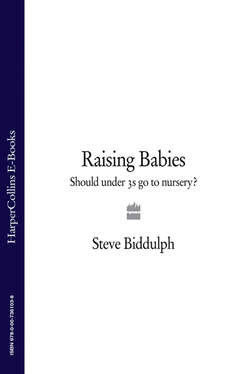Читать книгу Raising Babies: Should under 3s go to nursery? - Steve Biddulph, Steve Biddulph - Страница 5
A changed world
ОглавлениеThe explosion in the use of group daycare for very young children has to be set in a wider context. The world has also changed in the last 30 years. As huge corporations spanned the earth and grew more powerful than governments, their influence over daily life grew too. People everywhere felt they had to work harder, even though they were more prosperous than ever before. There was enormous pressure to consume more material goods. Everything was getting faster, more stressed and money-oriented – the old values of caring and community interdependence were being swept away. People had less and less time for their marriages, their communities, their friends and even their own children. We weren’t exactly slaves, we had a choice. But, to use Madeleine Bunting’s phrase, we were ‘willing slaves’3 – somehow going along with this deteriorating quality of life without question.
The use of nursery care for very young babies was part of this trend. As a psychologist, and as a parent of children who would have to live in this new world, I feared where it was all leading: that millions of children would have inferior-quality childhoods, and that the most important attribute that makes us human – the ability to love and care for each other – was not being passed on as it should. It is a fundamental tenet of psychology that in the first three years of life we learn the most important lesson of our whole lifetime – how to love. By giving away this precious window of intimate time, I feared we were raising a colder, sadder, more stressed and aggressive generation of children who might forever struggle to know what closeness and inner peace really felt like.
This book presents much objective evidence, but it also carries a strong professional opinion for which I don’t apologize. It is likely that some people will feel angry after reading it, and it may be unsettling for those who feel trapped by economic circumstances into placing their babies and toddlers in day nurseries when they would rather not. But my responsibility as a psychologist and educator is to be honest and to convey current findings and knowledge without gloss or deception.
So many voices in the parenting advice industry have a product to sell or an ideological agenda to advance. So few people are speaking on behalf of the children themselves. When I read childcare magazines and trendy books about parenting, their advice that ‘whatever you choose is right for you’ and ‘your child will be happy if you are happy’ sounds like feel-good rubbish – clever, slippery words that smooth over real concerns, and allay feelings of guilt that really should be listened to.
This is a parenting book that has a political message too. Successive UK governments have done a dismal job of supporting parents: leave provisions, job security and work flexibility laws are still decades behind progressive countries such as Denmark, Norway, France and especially Sweden (where there are today almost no babies attending daycare).4 There are some signs of willingness in the current government to look more closely at the needs of young families. This book adds to the arguments for giving parents what they need to raise healthy and well-loved kids.
At first, I was afraid to release this book. Five years ago when I began writing, its message seemed so confronting, so against the tide. So I discussed it with hundreds of people – nursery directors and staff, psychologists, psychiatrists, parents, grandparents, academics, researchers. All of them gave me the same feedback – that ‘someone had to speak up’, that the message was ‘urgently needed and long overdue’.
